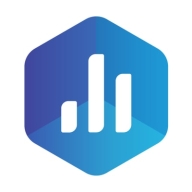

Tableau Enterprise and Databox compete in the data analytics space. Tableau Enterprise is preferred for complex data visualization, while Databox is favored for its ease of use and integration ease.
Features: Tableau Enterprise offers detailed visual analytics, extensive data source connections, and interactive dashboards. Databox is known for its ease of integration, custom metrics, and real-time data tracking.
Ease of Deployment and Customer Service: Tableau Enterprise's deployment is complex but supported by extensive documentation. Databox provides a straightforward deployment with efficient customer service, offering quicker setup and integration.
Pricing and ROI: Tableau Enterprise has higher upfront costs but significant ROI due to its analytics capabilities. Databox is a lower-cost option focusing on affordability and rapid ROI through quick deployment and customization.

Databox is a comprehensive business analytics platform that helps companies visualize and measure their key performance indicators. It offers instant access to critical data, streamlining decision-making for teams striving to improve efficiency and achieve goals.
Databox allows businesses to connect multiple data sources into one central dashboard, providing users with easy-to-understand insights. The interface is intuitive, facilitating quick navigation and configuration of dashboards. Users benefit from its wide range of integrations, making it possible to consolidate data across different platforms. Customizable alerts keep teams informed of any significant changes in data trends, helping them stay proactive. Room for improvement includes enhancing the customization options for deeper data analysis, which can further enhance strategic decision-making capabilities.
What features make Databox valuable?In industries like marketing and sales, Databox is used to consolidate campaign data, track progress, and optimize strategies. Finance departments use it to monitor cash flow and expense patterns, ensuring financial health is readily visible. Continual data updates make it indispensable for sectors needing agility and precision.
Tableau Enterprise offers powerful features for creating interactive visualizations, dashboards, and maps, including drag-and-drop functionality and easy integration with multiple data sources, promoting real-time collaboration and self-service analysis.
Tableau Enterprise stands out with its ability to create user-friendly, interactive visualizations, making it pivotal for business intelligence applications. Users benefit from its seamless connectivity and advanced analytical functions, facilitating data blending and storytelling. Despite a complex learning curve and high licensing costs, its features like geospatial analysis and efficient content distribution drive its indispensable value for data-driven insights. Enhancements in predictive analytics and support integration with machine learning tools further its capabilities across industries.
What are the most valuable features?Tableau Enterprise is widely used for business intelligence, supporting industries like healthcare, telecommunications, and finance. Organizations utilize it to analyze performance indicators, operational insights, and financial analytics, enhancing decision-making through interactive reports and real-time data integration.
We monitor all BI (Business Intelligence) Tools reviews to prevent fraudulent reviews and keep review quality high. We do not post reviews by company employees or direct competitors. We validate each review for authenticity via cross-reference with LinkedIn, and personal follow-up with the reviewer when necessary.